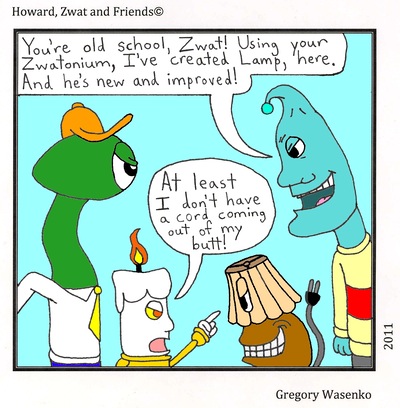 SMART TALK
SMART TALK
by Dr. Shirley Glibb
CURVE THE SCORE: In a recent issue of the Underbelly Prerecorder, our Lengua Loco County Superintendent of Schools was talking about the standardized tests the kids have to spend most of their time preparing for, thanks to the No Teacher Left Ahead government edicts.
"Some years, most of the kids score really low, so we curve the scores up so a realistic proportion can pass," he said.
Just to make sure of what I'm about to say, I consulted Mr. Tudor A. Lott, math teacher at Wesson High School, here in Underbelly, Texas.
"Aaargh!" began Mr. Lott. "That's not a curve; that's inflating all grades! Sorry. I've been so busy compiling data for the state and the feds that I can't keep up with my students' homework or plan lessons well. Give me a minute, would you?"
He collected his thoughts and began. "When you grade on a curve, you use basic statistical methods to process all the scores with a few formulas. The effect is that top scores may increase by very little; but gradually, more points may be added as scores drop. Sometimes, points added may decrease again, and by the lowest score, maybe nothing is added. You don't know until you apply the algebra. That's why it's called a curve: No set number gets added to everybody's score. That would simply be grade inflation."
I thought so. Curving up and curving down are terms that give away the speaker as ignorant thanks to with poor teacher training, little or no classroom experience, or both. Or maybe mathphobia.
v8i19
 Print
Print  The Ithaca Public Education Initiative today launched a $600,000 capital campaign designed to meet the growing demand for its educational grants and programs. An independent not-for-profit organization, IPEI facilitates community connections and innovative learning initiatives for thousands of pre-K–12th grade students and their teachers in the Ithaca City School District.
The Ithaca Public Education Initiative today launched a $600,000 capital campaign designed to meet the growing demand for its educational grants and programs. An independent not-for-profit organization, IPEI facilitates community connections and innovative learning initiatives for thousands of pre-K–12th grade students and their teachers in the Ithaca City School District.






 Spring is finally here, and what a great time for a musical in the Kitchen! Veteran Kitchen Theatre artistic collaborators Rachel Lampert & Larry Pressgrove’s 'Waiting for Spring' is an expansion of Act 2 of their well-received Comfort Food. The production boasts a cast of Broadway veterans. Previews are May 30th, 31st, and June 1st, and Opening Night is Saturday, June 2nd. It runs for three weeks, closing June 17th, 2012.
Spring is finally here, and what a great time for a musical in the Kitchen! Veteran Kitchen Theatre artistic collaborators Rachel Lampert & Larry Pressgrove’s 'Waiting for Spring' is an expansion of Act 2 of their well-received Comfort Food. The production boasts a cast of Broadway veterans. Previews are May 30th, 31st, and June 1st, and Opening Night is Saturday, June 2nd. It runs for three weeks, closing June 17th, 2012. Bits and shards of the history of Ithaca Pottery will be reviewed at a talk at The History Center on June 7, 2012, 5.30pm.
Bits and shards of the history of Ithaca Pottery will be reviewed at a talk at The History Center on June 7, 2012, 5.30pm.


 From May 4th through the 6th, the Community Arts Partnership (CAP) will present Spring Writes, the 2012 Finger Lakes Literary Festival. During this year's weekend-long festival of all things written, CAP will be collaborating with the Family Reading Partnership of Tompkins County(delete) for a special celebration of this year's "The Big Family Read."
From May 4th through the 6th, the Community Arts Partnership (CAP) will present Spring Writes, the 2012 Finger Lakes Literary Festival. During this year's weekend-long festival of all things written, CAP will be collaborating with the Family Reading Partnership of Tompkins County(delete) for a special celebration of this year's "The Big Family Read."